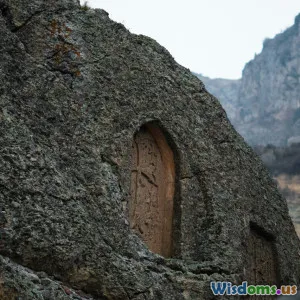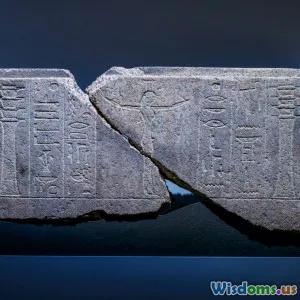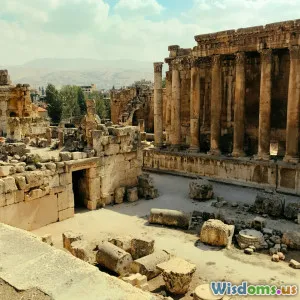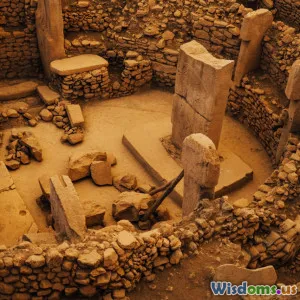
Ten Lost Civilizations Linked to Mysterious Supernatural Legends
10 min read Explore ten lost civilizations shrouded in supernatural legends and mysterious lore that continue to captivate historians and enthusiasts alike. (0 Reviews)
Ten Lost Civilizations Linked to Mysterious Supernatural Legends
Throughout history, humans have been fascinated by stories of lost civilizations—advanced cultures that vanished suddenly, leaving behind enigmatic ruins and inspiring a host of supernatural legends. These legends often include tales of curses, divine retribution, ghostly apparitions, or otherworldly technologies, blurring the boundary between myth and reality. In this article, we embark on a journey into the past, exploring ten notable lost civilizations entwined with mysterious supernatural lore.
1. Atlantis: The Prototypical Lost Continent
Perhaps the most famous lost civilization, Atlantis was described by the Greek philosopher Plato around 360 BCE as a powerful island nation submerged by the sea. Beyond its potential historical roots, Atlantis has become synonymous with utopian society, advanced technology, and cataclysmic destruction.
Supernatural Legends: Many believe Atlantis possessed knowledge beyond that of its contemporaries — some even speculate that Atlanteans had psychic abilities or harnessed mystical energies. Paranormal stories describe ghostly remnants of the city visible to divers or as a luminous underwater phenomenon in the Atlantic Ocean, although no definitive archaeological proof exists.
Example: The Bimini Road off the coast of the Bahamas intrigues some as a possible remnant of Atlantean architecture, fueling legends of hidden knowledge beneath the waves.
2. The Anasazi: Spirits of the American Southwest
The Anasazi, also known as the Ancestral Puebloans, inhabited the Four Corners region of the U.S., leaving behind complex cliff dwellings such as those in Mesa Verde.
Supernatural Legends: Native American folklore often interprets the sudden disappearance of the Anasazi around 1300 CE as influenced by spiritual factors. Some legends tell of cursed lands or warnings from spirit creatures leading to their migration. Paranormal investigators report unusual electromagnetic disturbances at these sites, fueling speculation about otherworldly presences.
Data Point: Modern archaeology attributes their departure mainly to drought and social factors, yet the supernatural narratives persist in popular culture.
3. The Olmecs and Their Enigmatic Heritage
Dating back to around 1400 BCE in Mesoamerica, the Olmecs are considered the “mother culture” for later civilizations, famous for colossal stone heads.
Supernatural Legends: They are often linked to mystical origins and alleged extraterrestrial contact due to the sophistication of their art and unclear roots. Legends describe strange beings teaching the Olmecs advanced knowledge, and some claim the heads contain encoded messages or protective curses.
Insight: Studies reveal the Olmecs developed complex religious systems, but no solid paranormal evidence underpins these myths.
4. The Lemurians: Myth or Reality?
Lemuria is a hypothesized lost continent proposed in the 19th century to explain biogeographical anomalies in the Indian and Pacific Oceans.
Supernatural Legends: Lemuria gained traction within theosophy circles as home to an ancient spiritually advanced race with psychic powers. Many occultists claim Lemurian crystals—smooth, striated stones—are remnants of Lemurian technology emitting healing energies.
Example: Though Lemuria lacks scientific support, it enjoys vibrant folklore status, influencing modern New Age movements.
5. The Minoans and the Labyrinth Mystery
Flourishing on Crete from approximately 3000 to 1450 BCE, the Minoans are celebrated for their palatial complexes, especially Knossos.
Supernatural Legends: Greek myths associate the Minoans with the labyrinth and the Minotaur, a half-man, half-bull creature said to haunt an elaborate maze. Some interpret this myth as a metaphor for hidden knowledge or secret religious rites involving mystical experiences.
Archaeological Authority: Excavations reveal advanced engineering and fresco art but no direct evidence for supernatural rituals.
6. The Indus Valley Civilization: Enigma of the Script
One of the world's earliest urban cultures (2600–1900 BCE), the Indus Valley civilization amazed with its planned cities and undeciphered script.
Supernatural Legends: Fringe theories propose that undecoded writings could be magical spells or instructions for summoning otherworldly forces. Some folklore speaks of a catastrophic event—possibly divine wrath—that led to their downfall.
Fact Check: Despite ongoing research, the mystery remains primarily linguistic and archaeological rather than paranormal.
7. The Nabateans: Desert Spirits of Petra
Known for carving magnificent cities out of rock, the Nabateans thrived in the desert of what is now Jordan.
Supernatural Legends: Local Bedouin tales invoke spiritual guardians of Petra, warning travelers of curses on anyone who disturbs the ruins. Some claim to hear mystical chanting or see phantom lights among the sandstone cliffs.
Historical Context: Nabateans were expert traders with advanced hydraulic engineering, but the supernatural lore adds a captivating dimension to their legacy.
8. The Etruscans: Whispering Ancients of Italy
Pre-dating the Romans, the Etruscans are famed for their art, tombs, and mysterious religion, which included elaborate afterlife beliefs.
Supernatural Legends: Tomb graffiti and artifacts imply consultations with spirits and necromancy. Stories persist of Etruscan ghosts guarding hidden treasure chambers and practicing shamanistic rites that blurred life's boundaries.
Expert Opinion: While archaeological finds support complex spiritual practices, evidence for actual supernatural events remains elusive.
9. The Olmec Colossal Heads: Living Stone Guardians?
While the Olmecs were already discussed as a civilization, their massive stone heads deserve separate legend.
Supernatural Legends: Rumors allege some heads display shifting expressions or might be animated by ancient protective spirits. Locals sometimes avoid touching these sculptures, fearing ill fortune.
Scientific View: The stone carvings likely represent rulers and are a testament to Olmec artistry rather than supernatural entities.
10. The Kingdom of Aksum: The Hidden Ark
Located in modern Ethiopia and Eritrea, Aksum was a trading empire around 100-940 CE, reputed in Ethiopian Orthodox tradition as the resting place of the Ark of the Covenant.
Supernatural Legends: Many stories claim the Ark was moved there by divine intervention, and some believe that Aksumites had mystical powers. Pilgrimages today continue, with strict customs reflecting the sacredness of the site.
Perspectives: Archaeologists confirm Aksum as a powerful kingdom; spiritual traditions bolster the mysterious allure about secrets still hidden.
Conclusion: Between History and Legend
Lost civilizations compel us not only because of archaeological mysteries but due to their rich blend of historical facts and supernatural legends. These stories resonate across cultures, reflecting humanity’s deep yearning to understand origins, mortality, and the unknown. Although many supernatural claims lack scientific support, they enrich cultural narratives and inspire continual exploration.
Whether you view these civilizations through the lens of myth or empirical research, their legacy reminds us that mystery is an enduring thread woven into the human story—a thread connecting past enigmas to our shared imagination.
References:
- Plato's "Timaeus and Critias"
- "Mesa Verde National Park" - National Park Service
- "The Olmecs: America's First Civilization" by Richard A. Diehl
- "The Theosophical Society" archives
- "Knossos and the Minoan Civilization" - Archaeological Institute of America
- "Deciphering the Indus Script" - Journal of Archaeological Science
- "Petra: A Trade and Cultural Crossroads" - UNESCO World Heritage
- "The Etruscans" by Graeme Barker
- Ethiopian Orthodox Church oral traditions
Explore beyond the ruins, where history entwines with mystery, and every stone may hide a story yet untold.
Rate the Post
User Reviews
Popular Posts



















